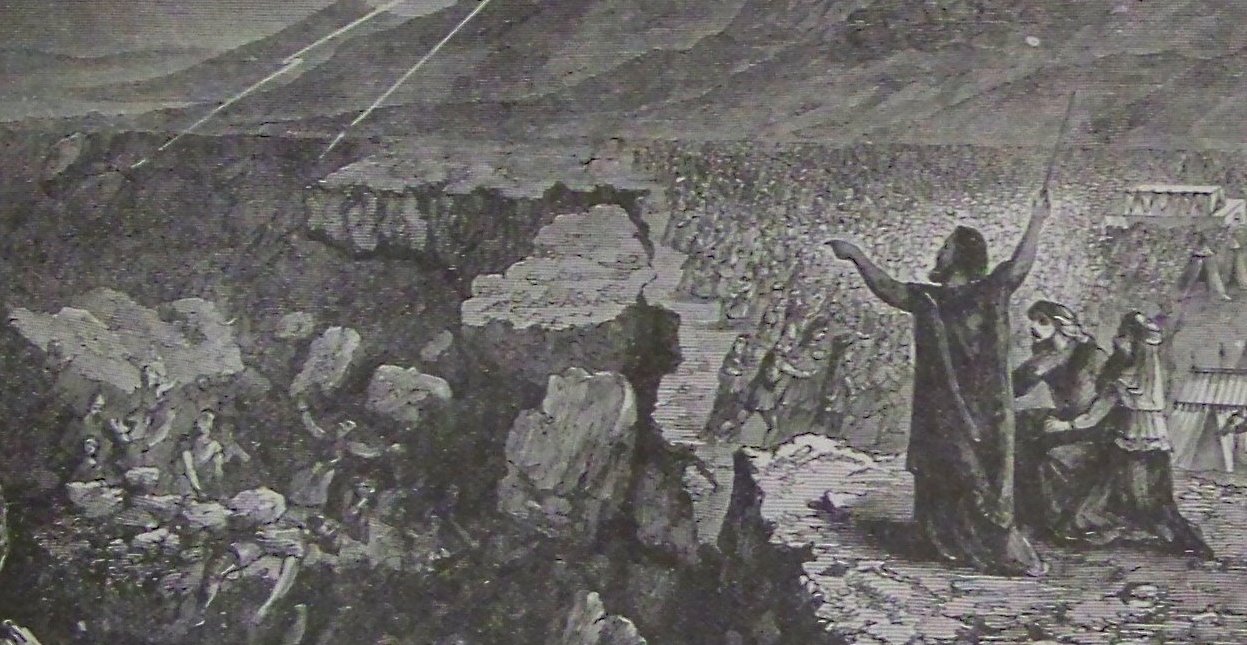Commentary on Parashat Korach, Numbers 16:1-18:32
In Parashat Korach, we learn about a rebellion by Korach and 250 other community leaders who accuse Moses and Aaron of being holier than the other Israelites. Moses responds by telling the Israelites that if those leading the rebellion die, they should know that their death comes from God not from him. Presumably, Moses knew what was about to unfold, saying that if the ground opened up to swallow Korach and his followers, they would go down into Sheol (the underworld) and vanish for eternity. As soon as Moses uttered these words, the ground did indeed open up and devour them. The rest of the Israelites flee for fear they too would be swallowed up by the earth.
Witnessing such an event would surely have been incredibly traumatic. And it’s certainly natural for the people to have fled in fear. Human beings are programmed for survival and in the face of destruction and death, we typically enter fight or flight mode. Our ancestors were no different. Numbers 16:34 reads: “Now all Israel that were around them fled at [the sound of] their voice, for they said: ’Lest the earth swallow us up.’”
But the Kli Yakar, a 17th commentary by Rabbi Shlomo Ephraim of Lunschitz, makes one small, but important tweak to the verse. Instead of translating the Hebrew word li to mean “at,” he translates it as “to.” Accordingly, he reads Numbers 16:34 as saying that the Israelites fled “to” the voices of Korach and his fellow agitators as they were swallowed alive.
What could it possibly mean that those who witnessed this event fled toward the voices? Wouldn’t we assume they would run away from the danger? The Kli Yakar suggests that the Israelites ran toward the sounds of those who had been swallowed up so they could hear the sins the deceased were confessing, hoping that if they avoided those sins they could prevent the earth from swallowing them.
With your help, My Jewish Learning can provide endless opportunities for learning, connection and discovery.
We often do something similar in the face of death. We often ask how the deceased died, or if they were healthy or suffering from a rare illness. We try to make sense of death in this way by reassuring ourselves that it wasn’t bad luck that caused it and that if we avoid whatever “sins” caused the death, we might extend our own lives.
Yet more often we behave in accordance with the plain meaning of the verse and flee, perhaps believing that if we don’t come too close, it won’t happen to us. But what if we followed the Kli Yakar’s teaching and moved toward it instead? What if we listened closely to what the mourners are experiencing and sharing? What could we learn about what pains them and what brings them comfort? What might we come to understand about what helps them get up in the morning and go to sleep each evening?
The wisdom of this week’s Torah portion teaches us two important lessons. First, we humans are biologically wired for survival. It’s normal for us to want to run from death and its accompanying grief. Second, if we can see the experience of death and mourning from a wider perspective, then we can learn to see the value in not fleeing. Rather, we can approach death and grief with inquiry and acceptance, with curiosity and surrender. We can learn from others’ mistakes and experiences by listening deeply without judgment. We can witness loss with presence and love. And we can learn that we do not have to be swallowed up by death and grief, recognizing that with good support systems, family and friends, we can hold and be held, comfort and be comforted.
This article initially appeared in My Jewish Learning’s Reading Torah Through Grief newsletter on June 23rd, 2023. To sign up to receive this newsletter each week in your inbox, click here.
Looking for a way to say Mourner’s Kaddish in a minyan? My Jewish Learning’s daily online minyan gives mourners and others an opportunity to say Kaddish in community and learn from leading rabbis.



